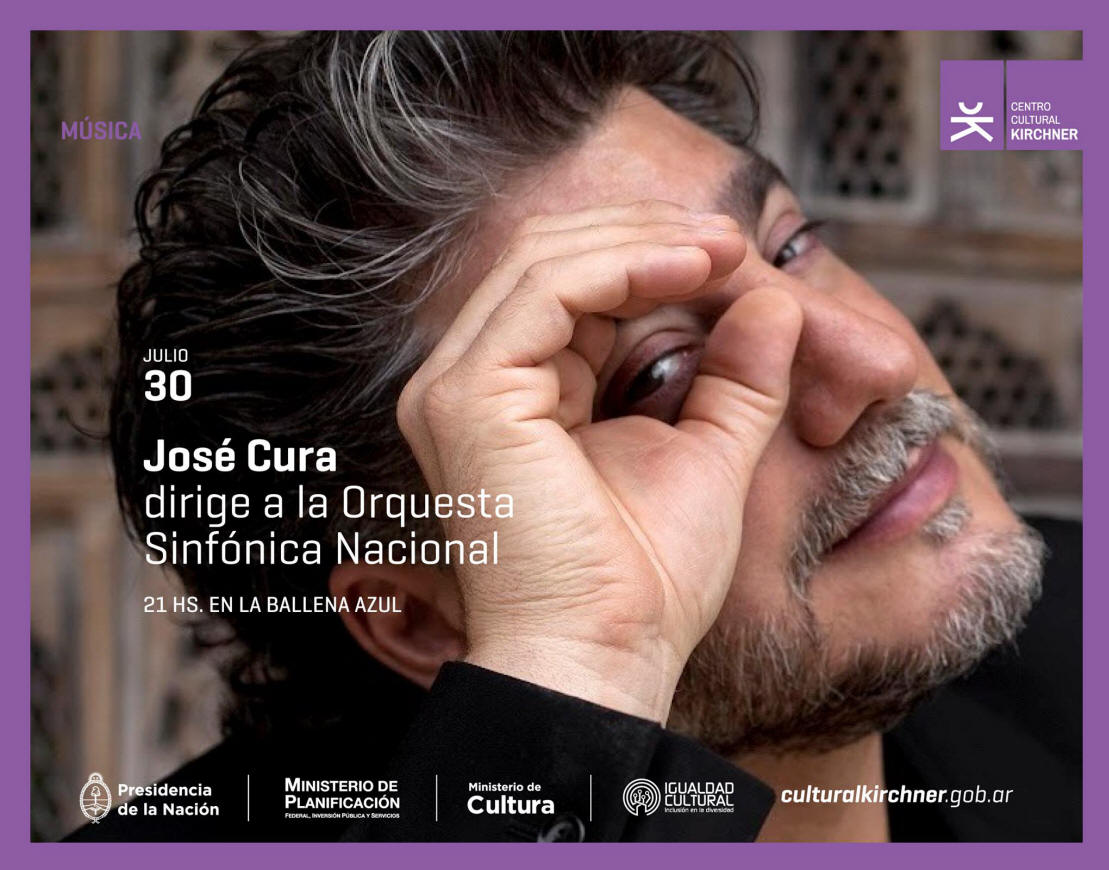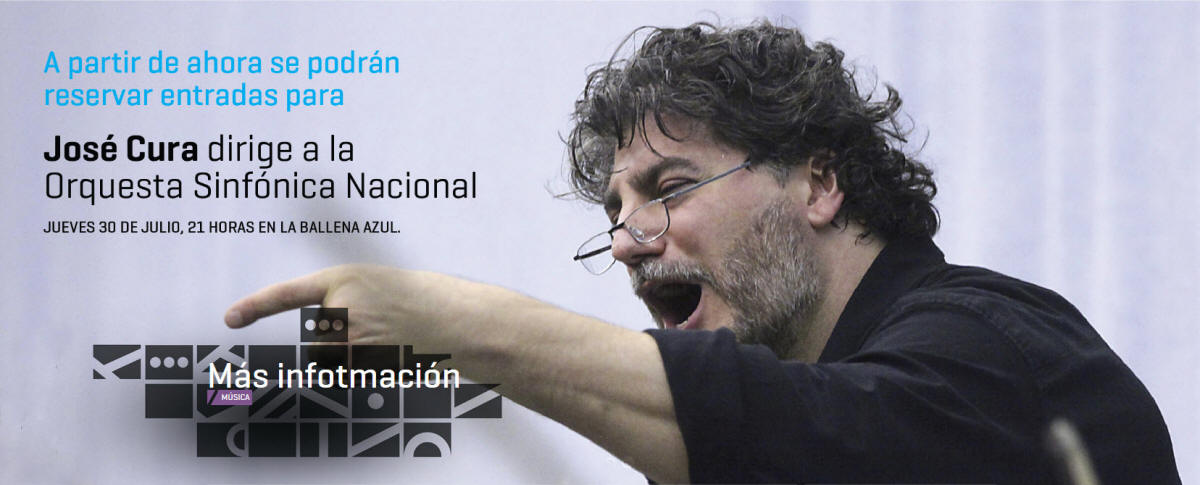Bravo Cura
Celebrating José Cura--Singer, Conductor, Director
Concerts
Concert Buenos Aires
30 July 2015
Buenos Aires - Mixed Symphonic

|
|
.jpg) |
| Note: This is a machine-based translation. It provides a general idea of the article's contents but should not be considered definitive.
Centro Cultural Kirchner José Cura dirigirá a la Orquesta Sinfónica Nacional El elenco ofrece un concierto el jueves 30 de julio a las 21, en la sala La Ballena Azul.
Jueves 30 de julio de 2015 Tenor, conductor and composer Argentine José Cura will lead the National Symphony Orchestra on Thursday, 30 July, at 21:00 in La Ballena Azul of the Centro Cultural Kirchner. The concert will offer free admission and tickets may be acquired online from 26 July from 10:00 until 18:00, via the website http://www.culturalkirchner.gob.ar/ tickets section or by telephone at (011) 6841-6400. You may reserve up to two locations per person and you must enter your full name and the DNI of both people. The program will include fragments from the opera Carmen by Georges Bizet with the soloists Guadalupe Barrientos, Enrique Folger, Tabering Daniela Fabian Veloz, Laura Polverini and Laura Domingue as well as the Symphony No. 9, also known as the New World Symphony, by Antonín Dvořák The concert can also be followed on the giant high definition screens with high fidelity sound which will be installed on the outside of the Centro Cultural Kirchner. Born in Rosario in 1962, José Cura is one of the biggest names in international opera. He is also a conductor, a director, and composer. He studied guitar, conducting, composition, and singing from an early age. At 21 he won a scholarship to study at the Teatro Colón, where he perfected his singing and performed for several years in the professional choir of the theater. In 1991, Cura traveled to Europe and in 1997 he settled in Spain, where he still lives. He has sung in major theaters around the world and conducted some of the most important orchestras in Europe. Throughout his career, he has been named Professor Honoris Causae, University CAECE, honorary citizen of Rosario, Knight of the order of the Cedar by the Lebanese Government, and appointed Director Principal Guest of the Symphonia Varsovia in Warsaw. He is also the patron of the New Devon Opera and Vice-President of the British Youth Opera. Famous for his particular vision of Otello, Cura is entering a new facet of his career, in which he is developing a greater emphasis on his profile as a conductor.
|

|
|
|
|
Note: This is a machine-based translation. It provides a general idea of the article's contents but should not be considered definitive
José Cura Captivated the Audience of the Kirchner Cultural CenterCultura31 July 2015With an original style, the tenor led the National Symphony Orchestra at La Ballena Azul in excerpts from the opera Carmen.The Rosario tenor and composer José Cura offered a surprising and unconventional concert as conductor of the National Symphony Orchestra, offered on Thursday, 30 July with free admission, in the auditorium of La Ballena Azul Kirchner Cultural Center. Cura proposed a program which began with excerpts from the opera Carmen by Georges Bizet, with Argentine soloists Guadalupe Barrientos, Enrique Folger, Tabering Daniela Fabian Veloz, Laura Polverini and Laura Dominguez. The multifaceted artist received a standing ovation when he arrived on stage but he was lighthearted as he presented, one by one, the singers while explaining their roles in the classic French opera. “So tonight, as announced, in the company of this super orchestra with which I have fallen in love in these last three days, we will sing the story of Carmen.” In the second half, Cura conducted the orchestra in a vibrant interpretation of the Symphony No 9, also known as From the New World, by the Czech composer Antonín Dvořák. At the end of the concert, Minister of Culture for the Nation, Teresa Parodi, who was in the audience of La Ballena Azul along with other officials, came on the stage to greet Cura and delivered presents to the opera singers. Parodi was full of praise for the Argentine tenor: “You can admire José as an opera singer but the truth is that it has been a wonderful surprise to see him conduct. He has dazzled all of us with the sound he achieved in the Orchestra, which was extraordinary. It was a night of luxury.”
|
|
|
||
|
Videos
|
|
|
|
Videos
Dvorak's 9th Symphony From the New World
José Cura, Conductor
La Orquesta Sinfónica Nacional Centro Cultural Kirchner
|
|
|
Concert - Buenos Aires
|
|
Note: This is a machine-based translation. It provides a general idea of the article's contents but should not be considered definitive--especially when the words are José Cura's own.
About the Emotional Concert on 30 July at the CCK José Cura 31 July 2015 Everything was ready to make a memorable concert—and it was—but in a sense that was not planned: Within twenty minutes of starting, an ugly storm hit the city and apparently lightning burned several electrical connections at the CCK. The stage and auditorium went dark. Emergency lights were turned on and the audience relaxed. Problems on the stage persisted. For a very long ten minutes I talked to the audience, telling them things about Carmen, its composer Bizet, and so on while waiting for the lights to come back on but I could not, even though I love doing it, spend the entire night talking. People had come to hear music… The National Symphony Orchestra, in a grand gesture of solidarity, proposed to play another number even in ‘half-light.’ It was a run of Carmen: not very difficult but delicate. I realized that, despite the goodwill of the musicians, the low visibility compromised the musical result and when the series finished, I left the stage to talk with technicians to get an idea of how serious the problem was. It was then that I learned about the lightning storm. It was quickly proposed to use as a guide the stage lights (which are used for theatrical lighting, which is different from those used to read) that would point at the musician. These lights, as beautiful as they may be, are not intended to be used as reading lights so that the solution, despite being the only one available, was not ideal. Even worse, these devices generate so much heat that they have a fan which, to cool them, force the resulting hot air downward. And down was where we were trying to play…. The temperature went up a lot, with the equivalent result for the Orchestra and its servant. We finished the first half of the concert under those conditions and during the interval we tried to fix the problem. It was impossible. The problem exceeded the technical limits of the theater and involved several of the surrounding areas. It was decided to continue the show with the lights we had. The orchestra played brilliantly even under the harsh lighting conditions. Halfway through the third movement, however, I could feel the eyestrain of the musicians, coupled with the tremendous heat from the lights and knew the conditions were taking their toll. Even I, despite having memorized the work (hence did not have to read the score), had to concentrate hard to beat the involuntary fatigue caused by the heat and lighting. We finished the third movement on pure courage. I paused for a moment and looked at the musicians as if to say “fasten your seatbelts” to endure the last movement and then we started. The end, as those of you who were present know, was tremendous. Until the next time! A hug, José Cura |
|
|
|
|
Last Updated: Sunday, September 18, 2022 © Copyright: Kira